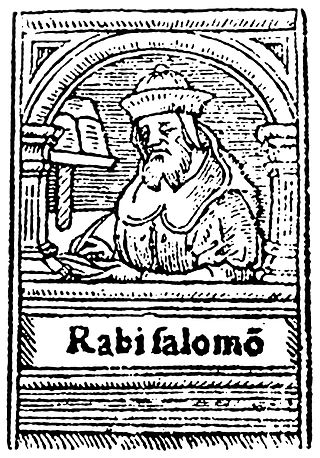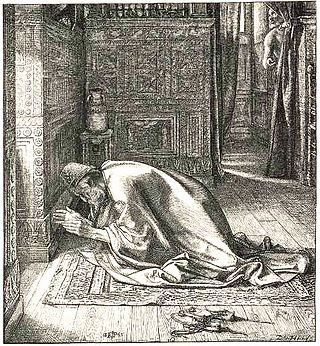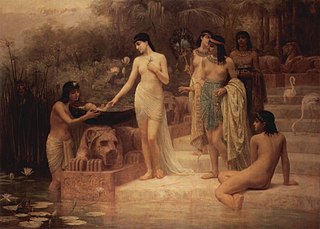
Shlomo Yitzchaki, commonly known by the acronym Rashi, was a French rabbi who authored comprehensive commentaries on the Talmud and Hebrew Bible.

Sarah is a biblical matriarch, prophet, and major figure in Abrahamic religions. While different Abrahamic faiths portray her differently, Judaism, Christianity, and Islam all depict her character similarly, as that of a pious woman, renowned for her hospitality and beauty, the wife and half-sister of Abraham, and the mother of Isaac. Sarah has her feast day on 1 September in the Catholic Church, 19 August in the Coptic Orthodox Church, 20 January in the LCMS, and 12 and 20 December in the Eastern Orthodox Church.

Nimrod is a biblical figure mentioned in the Book of Genesis and Books of Chronicles. The son of Cush and therefore the great-grandson of Noah, Nimrod was described as a king in the land of Shinar. The Bible states that he was "a mighty hunter before the Lord [and] ... began to be mighty in the earth". Some later (non-biblical) traditions, interpreting the story of Jacob's dream in the Bible, identified Nimrod as the ruler who had commissioned the construction of the Tower of Babel or of Jacob's Ladder, and that identification led to his reputation as a king who had been rebellious against God.

Zipporah is mentioned in the Book of Exodus as the wife of Moses, and the daughter of Jethro, the priest and prince of Midian.

Targum Onkelos is the primary Jewish Aramaic targum ("translation") of the Torah, accepted as an authoritative translated text of the Five Books of Moses and thought to have been written in the early second century CE.

Prayer in the Hebrew Bible is an evolving means of interacting with God, most frequently through a spontaneous, individual or collective, unorganized form of petitioning and/or thanking. Standardized prayer such as is done today is non-existent. However, beginning in Deuteronomy, the Bible lays the groundwork for organized prayer including basic liturgical guidelines, and by the Bible's later books, prayer has evolved to a more standardized form, although still radically different from the form practiced by modern Jews.

Lech-Lecha, Lekh-Lekha, or Lech-L'cha is the third weekly Torah portion in the annual Jewish cycle of Torah reading. It constitutes Genesis 12:1–17:27. The parashah tells the stories of God's calling of Abram, Abram's passing off his wife Sarai as his sister, Abram's dividing the land with his nephew Lot, the war between the four kings and the five, the covenant between the pieces, Sarai's tensions with her maid Hagar and Hagar's son Ishmael, and the covenant of circumcision.

Zipporah at the Inn is the name given to an episode alluded to in three verses in the 4th chapter of the Book of Exodus. The much-debated passage is one of the more perplexing conundrums of the Torah due to ambiguous references through pronouns and phrases with unclear designations. Various translations of the Bible have sought to make the section clearer through a restructuring of the sentences with a more indirect, yet more straightforward, interpretation.

Chayei Sarah, Chaye Sarah, Ḥayye Sarah, or Ḥayyei Sara, is the fifth weekly Torah portion in the annual Jewish cycle of Torah reading. It constitutes Genesis 23:1–25:18. The parashah tells the stories of Abraham's negotiations to purchase a burial place for his wife Sarah and his servant's mission to find a wife for Abraham's son Isaac.

Vayishlach is the eighth weekly Torah portion in the annual Jewish cycle of Torah reading. In the parashah, Jacob reconciles with Esau after wrestling with a "man." The prince Shechem rapes Dinah, whose brothers sack the city of Shechem in revenge. In the family's subsequent flight, Rachel gives birth to Benjamin and dies in childbirth.

Shemot, Shemoth, or Shemos is the thirteenth weekly Torah portion in the annual Jewish cycle of Torah reading and the first in the Book of Exodus. It constitutes Exodus 1:1–6:1. The parashah tells of the Israelites' affliction in Egypt, the hiding and rescuing of the infant Moses, Moses in Midian, the calling of Moses, circumcision on the way, meeting the elders, and Moses before Pharaoh.
Tobiah ben Eliezer was a Talmudist and poet of the 11th century, author of Lekach Tov or Pesikta Zutarta, a midrashic commentary on the Pentateuch and the Five Megillot.

Behaalotecha, Behaalotcha, Beha'alotecha, Beha'alotcha, Beha'alothekha, or Behaaloscha is the 36th weekly Torah portion in the annual Jewish cycle of Torah reading and the third in the Book of Numbers. The parashah tells of the Menorah in the Tabernacle, the consecration of the Levites, the Second Passover, how pillars of cloud and fire led the Israelites, the silver trumpets, how the Israelites set out on their journeys, the complaints of the Israelites, and how Miriam and Aaron questioned Moses. The parashah comprises Numbers 8:1–12:16. It is made up of 7,055 Hebrew letters, 1,840 Hebrew words, 136 verses, and 240 lines in a Torah Scroll.

In the Hebrew Bible, Melchizedek was the king of Salem and priest of El Elyon. He is first mentioned in Genesis 14:18–20, where he brings out bread and wine and then blesses Abram, and El Elyon or "the Lord, God Most High". Abram was returning from pursuing the kings who came from the East and gave him a "tenth of everything".

Pirkei de-Rabbi Eliezer is an aggadic-midrashic work of Torah exegesis and retellings of biblical stories. Traditionally, the work is attributed to the tanna Eliezer ben Hurcanus and his school. Modern research suggests that the text is pseudepigraphic from the Geonic period of the eighth century, written in or near the Land of Israel.
According to Judaism, the priestly covenant is the biblical covenant that God gave to Aaron and his descendants, the kohanim. This covenant consisted of their exclusive right to serve in the Temple, and to consume sacrificial offerings and receive other priestly gifts.

Rebecca appears in the Hebrew Bible as the wife of Isaac and the mother of Jacob and Esau. According to biblical tradition, Rebecca's father was Bethuel the Aramean from Paddan Aram, also called Aram-Naharaim. Rebecca's brother was Laban the Aramean, and she was the granddaughter of Milcah and Nahor, the brother of Abraham. Rebecca and Isaac were one of the four couples that some believe are buried in the Cave of the Patriarchs, the other three being Adam and Eve, Abraham and Sarah, and Jacob and Leah. Most scholars have considered Rebecca's historicity uncertain.

2 Kings 8 is the eighth chapter of the second part of the Books of Kings in the Hebrew Bible or the Second Book of Kings in the Old Testament of the Christian Bible. The book is a compilation of various annals recording the acts of the kings of Israel and Judah by a Deuteronomic compiler in the seventh century BCE, with a supplement added in the sixth century BCE. This chapter records Elisha's acts in helping the family of Shunammite woman to escape famine, then to gain back their land and in contributing to Hazael's ascension to the throne of Syria (Aram) in verses 7–15; then subsequently records the reigns of Joram and Ahaziah, the kings of Judah.

2 Chronicles 20 is the twentieth chapter of the Second Book of Chronicles the Old Testament in the Christian Bible or of the second part of the Books of Chronicles in the Hebrew Bible. The book is compiled from older sources by an unknown person or group, designated by modern scholars as "the Chronicler", and had the final shape established in late fifth or fourth century BCE. This chapter belongs to the section focusing on the kingdom of Judah until its destruction by the Babylonians under Nebuchadnezzar and the beginning of restoration under Cyrus the Great of Persia. The focus of this chapter is the reign of Jehoshaphat, king of Judah.

















